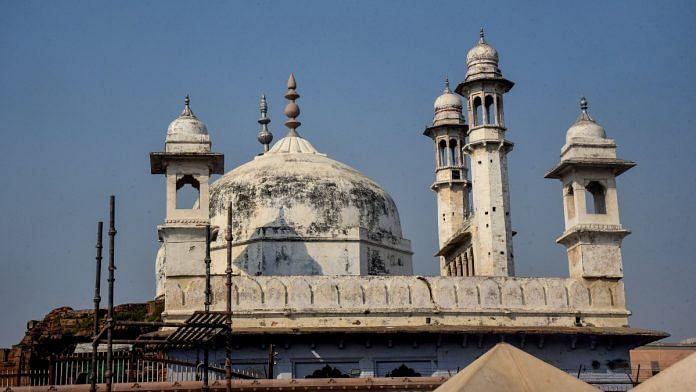New Delhi: The status quo is to be maintained in the Gyanvapi mosque complex, the Supreme Court ordered Monday as it issued a notice on the mosque management committee’s appeal against the Allahabad High Court’s decision to allow religious observances by Hindu priests in the cellar of the disputed site.
The notice was issued to Hindu petitioners in the civil suit pending before the trial court, on whose application the puja was permitted.
A three-judge bench led by Chief Justice D.Y. CHandrachud ordered: “…it would be appropriate to maintain a status quo so as to enable both the communities to offer religious worship in the terms of the order (trial court and high court)”.
It further added that none of the parties “shall disturb the status quo” without obtaining leave of the top court. But the bench declined to immediately stay the HC order that upheld a Varanasi civil court’s judgement to allow Hindus to worship in the cellar.
The bench, however, clarified that offerings made by a priest, appointed by the Kashi Vishwanath Temple trust, in the cellar shall be in accordance with the trial court order and subject to the custody of the observer nominated by it.
Directing the appeal be listed in the third week of July, the court said the party on whose application the Varanasi civil court allowed Hindu prayers in the cellar located below the mosque, shall submit their response to the mosque committee’s appeal on or before 30 April.
On 26 February, the Allahabad HC dismissed the Gyanvapi Mosque management committee’s appeal against the trial court of 17 and 31 January allowing worship rituals inside the “Vyas Tehkhana” — situated in the southern cellar of the Gyanvapi mosque.
While the 17 January order designated a district magistrate as the recipient of the Vyas Tehkhana, the 31 January direction permitted puja to be performed there.
In doing so, the HC observed that the Uttar Pradesh government’s decision in 1993 to seal the cellar was illegal because the action was taken in the absence of any order in writing. Currently, a Hindu priest nominated by the Kashi Vishwanath temple conducts prayers in the cellar.
Assailing both the Varanasi civil court and Allahabad HC orders, senior advocate Huzefa Ahmadi — who appeared for the mosque committee — submitted that the directions were in the form of mandatory injunctions and virtually amounted to the grant of final relief at the interlocutory or the interim stage.
Ahmadi put across four objections to the orders under challenge. He said the cellar was locked from 1993 until 2023 and there was no evidence to establish that Hindu prayers were being offered there.
Since the premises of the tehkhana or cellar were locked for 30 years, there was no urgency to grant a mandatory injunction to permit religious ceremonies through a priest to be named by the plaintiff in the civil suit and Kashi Vishwanath Trust Board for the idols, if any, located in the cellar, he told the bench.
According to Ahmadi, none of the conditions precedent for the appointment of a receiver were fulfilled and there was no possibility of the destruction of the place, warranting the 31 January order.
The lawyer maintained that the mosque stood on a wakf property and that through applications filed in the Varanasi civil court “bit by bit and piece by piece” a gradual attempt was being made to chip away the total mosque complex.
He pointed to the top court’s 2023 order that led to the sealing of the wazukhana in the mosque premises. The wazukhana was made out of bounds for Muslims after the two sides differed on the nature of the structure, with the Hindu side claiming it to be a shivling and Muslims saying it was a fountain.
Also read: Judge Vishvesha’s last Gyanvapi order sets his legacy. It’s like Ayodhya all over again
On the above mentioned grounds, Ahmadi argued, the HC order would warrant the top court’s interference. He even pointed out that 20 civil suits have been filed in the Varanasi court and other applications that want the court to stop Muslims from offering prayers in the courtyard under which the cellar is located.
Senior advocate Shyam Divan, appearing for those on whose application the puja was permitted in the cellar, told the court that entry to the tehkhana was distinct from the entry to the mosque. This was, however, countered by Ahmadi who said the entrance door to the cellar was very much a part of the mosque premises.
Divan insisted the civil court and HC orders were well-reasoned, not warranting the top court’s intervention at the interlocutory stage. He argued that it would be incorrect to postulate that a final relief has been granted in the form of a mandatory injunction as the final relief sought in the suit pertained to the claim of the Vyas family to perform religious worship, which has not yet been decided.
By an interim working arrangement, a temple trust has nominated a priest to carry out religious services. Divan contended the cellar continued to be in the possession of the Hindus until the locks were placed by the state administration and the Vyas family in 1993.
Responding to Divan’s submissions, Ahmadi complained against the state administration’s alacrity in implementing the trial court order of 31 January 2024. It was done within four hours of the order, leaving the mosque management committee with no recourse to see their remedies before the high court.
(Edited by Tikli Basu)
Also read: Did Aurangzeb destroy Hindu temples primarily for political reasons? What his choices reveal



